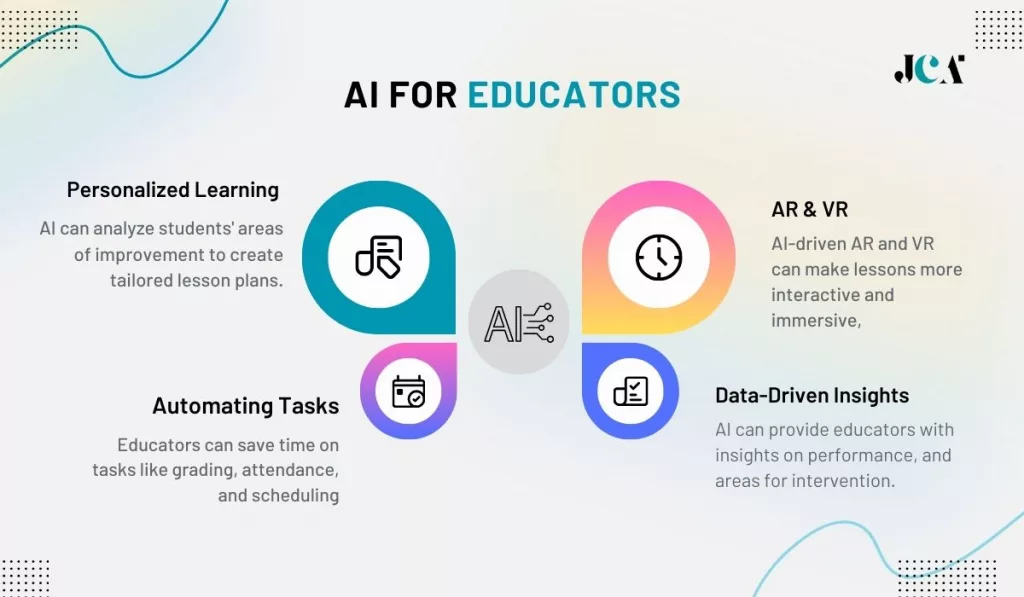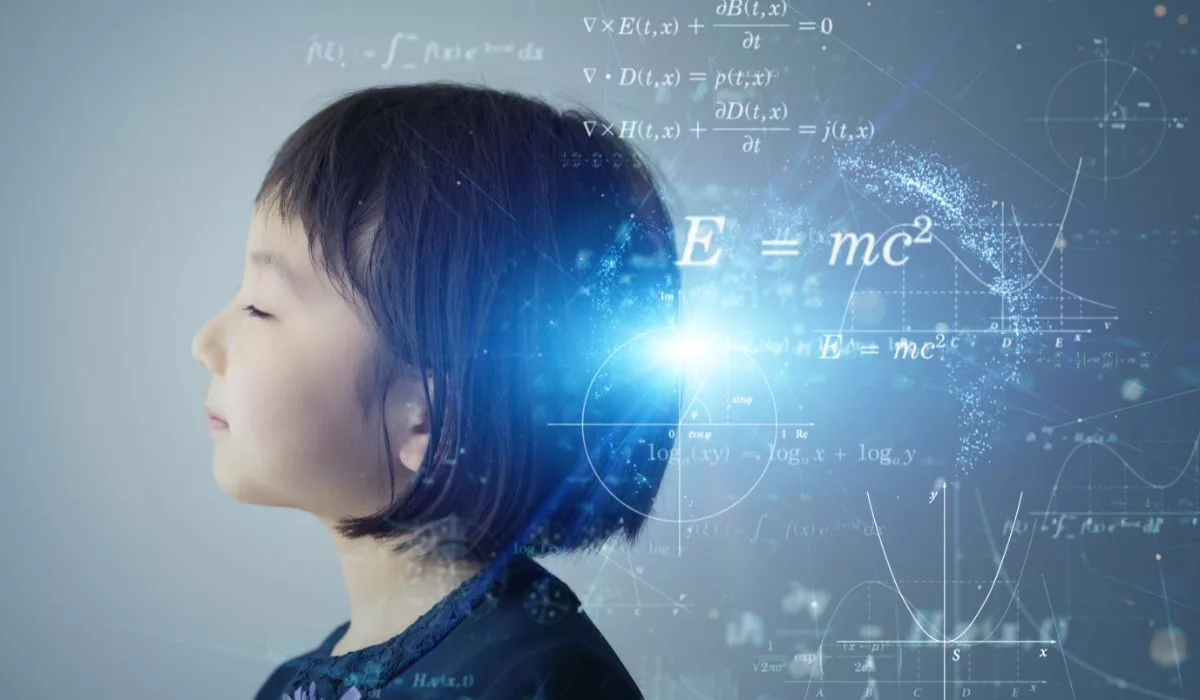Artificial Intelligence (AI) has revolutionized various industries, and the field of education is no exception. AI refers to the simulation of human intelligence in machines that are programmed to think and learn like humans. In the context of education, AI can be utilized to enhance learning strategies and improve teacher efficiencies.
Artificial Intelligence (AI) in Education Market size reached USD 4 billion in 2022 and is projected to expand at over 10% CAGR from 2023 to 2032, owing to the growing inclination towards personalized learning.
The importance of incorporating AI in education cannot be overstated. With the rapid advancements in technology, traditional teaching methods are becoming outdated, making way for innovative approaches that leverage AI capabilities. By integrating AI into educational practices, educators can access a wide range of benefits that significantly impact both students and teachers.

Also read: How to make an AI App?
Enhancing Personalized Learning Experiences
One key benefit of AI in education is the ability to enhance personalized learning experiences. Every student has unique strengths, weaknesses, and learning styles. With AI-powered tools and platforms, educators can tailor instruction to meet individual student needs more effectively. For example, intelligent tutoring systems can analyze students’ performance data and provide personalized recommendations or adaptive learning paths based on their specific requirements. This level of personalization ensures that students receive targeted support and guidance, enabling them to maximize their potential.
Personalized learning has become increasingly important in the field of education, and AI technology has the potential to greatly enhance this approach. With AI-powered tools, educators can tailor instruction to meet the unique needs and abilities of individual students.
You may also like to read: Top Offshore AI Development Companies | Best Offshore AI Developers
How AI can help in Building Personalized Learning?
One way AI can personalize learning is through adaptive learning platforms. These platforms use machine learning algorithms to analyze student performance data and provide targeted feedback and recommendations. For example, an AI-powered math program can identify areas where a student is struggling and provide additional practice exercises or resources to help them improve. Additionally, integrating AI-powered search within these platforms can further enhance the ability to find relevant learning materials tailored to each student’s needs. This personalized approach allows students to progress at their own pace and focus on areas where they need the most support.

AI can also facilitate personalized learning through intelligent tutoring systems. These systems use natural language processing and machine learning techniques to interact with students in a conversational manner. They can answer questions, provide explanations, and offer guidance based on the student’s individual needs. For instance, an intelligent tutoring system for language learning can assess a student’s pronunciation skills and provide real-time feedback to help them improve.
You might like reading: How Virtual Reality (VR) in Education is Changing Edtech Industry?
Benefits of Personalized Learning with AI
The benefits of personalized learning with AI are numerous. Firstly, it allows students to take ownership of their own learning journey by providing them with opportunities for self-paced exploration and growth. This fosters a sense of autonomy and motivation, as students feel empowered to make choices about what they want to learn and how they want to learn it.
Secondly, personalized learning with AI enables educators to better understand each student’s strengths, weaknesses, and preferred learning styles. By gathering data on student performance and engagement patterns, teachers can gain valuable insights into how best to support each individual learner. This data-driven approach helps educators make informed decisions about instructional strategies, interventions, and resources that will benefit their students the most.
Furthermore, personalized learning with AI promotes deeper understanding and retention of knowledge. When students receive instruction that is tailored specifically to their needs, they are more likely to engage actively with the material and develop a deeper understanding of key concepts. This personalized approach also allows students to build on their prior knowledge and make connections between different topics, leading to improved long-term retention.
Also read: Top 5 Educational Apps for Homeschooling Parents
Automating Administrative Tasks
In the field of education, administrative tasks can often be time-consuming and tedious for educators and school administrators. From managing student records to scheduling classes, these tasks can take up a significant amount of time that could otherwise be spent on more important activities, such as lesson planning and engaging with students. However, with the advent of artificial intelligence (AI), educators now have access to tools and technologies that can automate many of these administrative tasks, allowing them to focus their time and energy on what matters most – teaching.
AI in Grading, Attendance, and Scheduling
One of the key benefits of AI in education is its ability to automate administrative tasks. By leveraging AI-powered tools and technologies, educators can streamline processes such as grading assignments, generating report cards, and managing student attendance. These tasks are often repetitive and time-consuming, but with AI automation, they can be completed quickly and accurately.
For instance, AI-powered grading systems can analyze student responses to multiple-choice questions or even essays and provide instant feedback. This not only saves educators valuable time but also ensures consistency in grading across different assignments. Similarly, AI algorithms can generate report cards based on predefined criteria, eliminating the need for manual data entry and reducing the chances of human error.
Another area where AI automation proves beneficial is in managing student attendance. Traditionally, teachers would manually mark attendance for each class session. However, with AI-based facial recognition technology or biometric systems, attendance tracking becomes automated. This not only saves time but also ensures accurate records without any room for manipulation.

Furthermore, AI can assist in automating administrative tasks related to scheduling classes and organizing timetables. With intelligent algorithms that consider factors such as teacher availability, classroom capacity, and student preferences, schools can create optimized schedules that minimize conflicts and maximize learning opportunities.
The benefits of automating administrative tasks through AI extend beyond saving time. By removing the burden of these mundane responsibilities from educators’ shoulders, they are able to focus their attention on more meaningful and impactful activities. This, in turn, can lead to improved job satisfaction and overall teacher well-being.
Also have an eye on: AI-Driven Business Ideas Across Diverse Industries
Improving Student Engagement and Performance
AI has the potential to greatly improve student engagement and performance in the classroom. By leveraging AI-powered tools and technologies, educators can create more interactive and personalized learning experiences for their students. One of the key ways AI can enhance student engagement is through adaptive learning platforms. These platforms use machine learning algorithms to analyze each student’s individual strengths, weaknesses, and learning styles, allowing educators to tailor their instruction accordingly.
This customization leads to a deeper understanding of each student, enabling educators to create FAQ pages that are tailored to address the specific needs and queries of individual learners, enhancing the learning experience.
Adaptive Learning Platforms
When students are presented with content that is specifically designed to meet their unique needs, they are more likely to stay engaged and motivated to learn. Adaptive learning platforms can also provide real-time feedback and support to students, helping them track their progress and identify areas where they may need additional assistance. This personalized approach not only improves engagement but also helps students develop a deeper understanding of the material.
AI-Powered Virtual Assistants
In addition to adaptive learning platforms, AI-powered virtual assistants can also play a role in improving student engagement. These virtual assistants can provide instant answers to student questions and offer guidance whenever needed. Students no longer have to wait for a teacher’s availability or feel embarrassed about asking questions in front of their peers. The virtual assistants can create a safe and supportive environment where students feel comfortable seeking help.
Moreover, AI tools can be used to enhance student performance by providing targeted interventions when needed. For example, intelligent tutoring systems can identify specific areas where a student is struggling and offer additional practice or resources to help them master the concept. These systems can adapt their instruction based on the student’s progress, ensuring that they receive the right level of support at all times.
By leveraging AI-powered tools for improving student engagement and performance, educators can create a more inclusive and effective learning environment. Students who are actively engaged in their education are more likely to perform well academically and develop important skills such as critical thinking, problem-solving, and collaboration.
You may also like: Impact of AI on Web3 Advertising: Personalization and Privacy
Final Words: The Future of Education with AI
AI offers numerous benefits for educators in terms of enhancing learning strategies and efficiency. By leveraging AI-powered tools such as adaptive learning platforms and virtual assistants, educators can create personalized learning experiences that cater to the individual needs of each student. These tools also provide real-time feedback and support, helping students stay engaged and motivated. Additionally, AI tools can target interventions to improve student performance by identifying areas where additional practice or resources are needed. Overall, AI has the potential to revolutionize education by improving student engagement and performance, ultimately leading to better educational outcomes for all students.










Leave a Reply